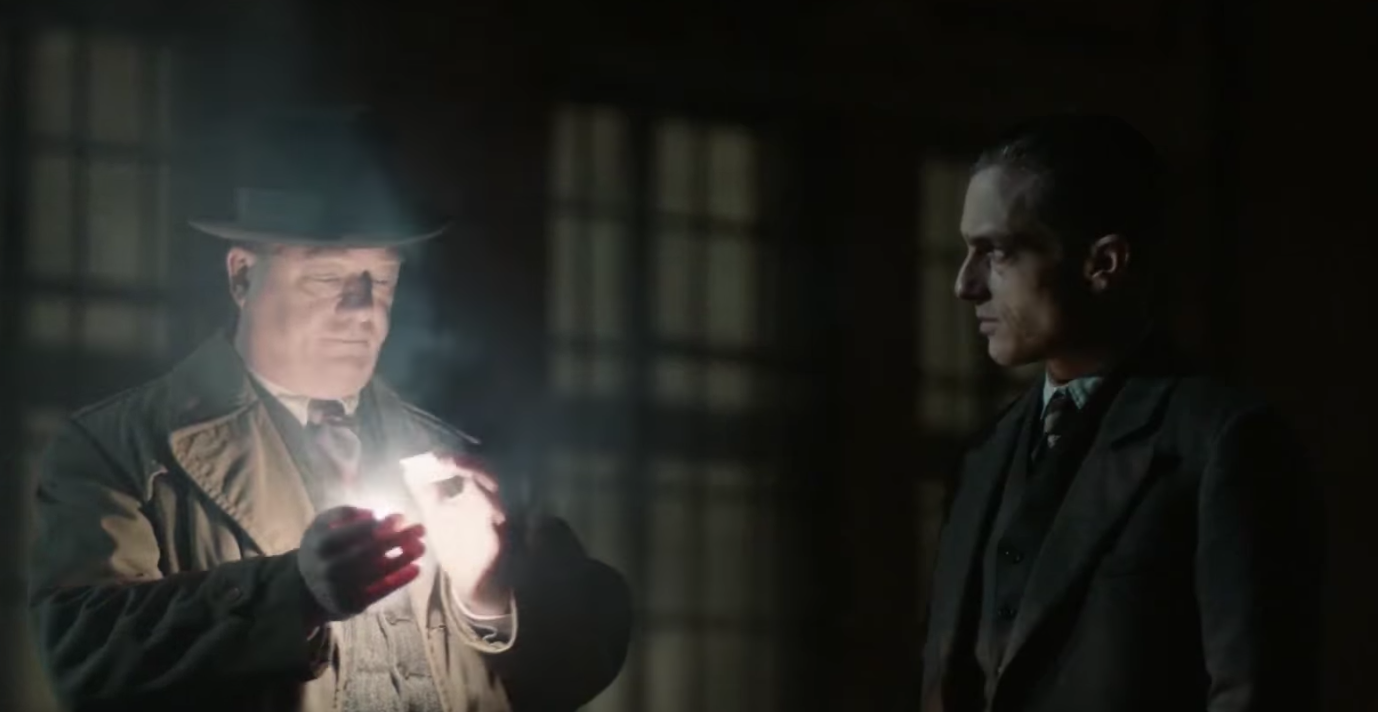At this point in Netflix’s ceaseless campaign of exclusive programming, it should no longer be a controversial statement to say that the bulk of the service’s original series are thoughtfully rendered, easily slotted into specific genres, and generally unadventurous. A relatively new addition, Babylon Berlin, might blend in with the crowd on the queue, one of the dizzying litany of new and supposedly “trending” shows that becomes a persistent, nagging suggestion until it’s inevitably buried by an onslaught of new ones. Babylon Berlin may have been recently recommended to you alongside other Netflix-branded period pieces like The Crown or Morocco: Love In Times of War, but further investigation (and a bit of patience) reveals the German historical epic, set in Weimar-era Berlin in 1929, to be one of the finest and most ambitious series Netflix has yet plastered its name onto. It makes the argument that when you scroll through Netflix’s array of original shows and ask yourself “who watches this shit?” sometimes—maybe—the answer should be you.
Part of the key may be that Babylon Berlin is Netflix’s “original programming” only with scare quotes applied, as opposed to a product of the company’s own studios. Based on a series of novels by Volker Kutscher, the series’ first two eight-episode seasons premiered on German and British stations at the end of last year, before Netflix distributed them internationally in January. The show is the product of the combined efforts of three accomplished German film directors and writers: Achim von Borries, Hendrik Handloegten, and Tom Tykwer, who is most famous internationally for Run, Lola, Run (also, Perfume and Cloud Atlas). Even if you’re resistant to distinguish some TV shows as something closer to “serialized film,” the specifically cinematic touch is clear in Babylon Berlin‘s scope, budget ($44 million), pacing, and overall cinematographic aesthetic. It’s been compared to Rainer Maria Fassbinder’s innovative near-16-hour television film, 1980’s Berlin Alexanderplatz, which begins in the same time period.
Nonetheless, the series takes a while to settle into. The first few episodes feel like one extended, knotty exposition section; they don’t individually adhere to the normal list of responsibilities of the plot of a TV episode. The learning curve for Twyker and the gang’s style recalls the beginning of other cult-favorite epics like The Wire or Deadwood, shows that were underappreciated at the time of their airing due in part to their elaborate worlds, unique perspectives, and complexity. Unlike those series, the uphill battle with Babylon Berlin is not familiarizing yourself with a particular accent, glossary of lingo, or stylistic affectation. Similarly, though, the show’s main character is a town–in this case, a huge, sprawling city full of dynamic contractions. Affluence, decrepitude, idealism, nihilism, zealotry, corporate greed, violence, political progressive, rampant drug addiction, racial prejudice, and sexual freedom of expression all jostle up next to each other, and often within the main characters. For all their memorable personal quirks, the show’s key figures are still manifestations of different elements of the city and its culture, and it takes quite a while and a bit of careful attention to categorize them.
The reason for the complexity, of course, is the show’s central spy-thriller charge. In the expository episodes, especially, no one appears to be the discrete moral center of the show. Can we really know who anyone is until we know whose side they are on? At the center of the action is the mysterious, sometimes cold, and strangely charismatic protagonist, the curiously named Gereon Rath, played by the striking, perpetually tortured-looking Volker Bruch. Rath is a police detective (from Cologne, like the martyred Saint for which he is named) who has taken a gig on the vice squad in Berlin for mysterious reasons. We quickly learn that he is not simply the stock noir cop with a dark secret he initially appears to be—in fact, he has several dark secrets. These include a dominant drug addiction (think Clive Owen in The Knick but with flashbacks from the trenches) and some dark family secrets. Another surprise: he also does a mean, hair-discombobulating Charleston.
In the opening stages of the show, Rath appears to be compromising his own police work, tangling himself up in knots trying to both valiantly uncover corruption at the high-political level while also serving his own shadowy master. At first, his boorish and seedily charming partner Bruno Wolter (Peter Kurth) seems on the side of right–at least, in the traditional “natural po-lice” sense–and a buddy cop kind of plot seems to be hatching. Soon, it becomes clear that something far thornier than that is in the cards—that there’s a lot more underscoring Rath and Wolter’s love-hate relationship around the office.
This is the entire substance of Babylon Berlin’s dizzying world of betrayals and back-alley assassinations: Everyone has to serve somebody. Sidemen like the uncompromising Jewish chief of police Benda and emasculated corporate heir Alfred Nyssen illustrate this point as much as the show’s primary players. But ultimately, everyone and the plot itself must defer—and it does this tastefully, in thankfully non-stereotypical ways—to the oncoming storm. If 1929 Berlin was a haven for any number of revolutionaries and reactionaries, as well a government at war with itself, escalating events would help simplify the categories in the near future. Eventually, any given citizen had the same choice: to be with fascism or against it.
The structure of Babylon Berlin is powerful because it begins at the maximum level of complexity and gradually narrows, clarifying the allegiances and motivations of its many figures–shady, craven, or some fractured variation of honorable–through one memorable showdown after another. Eventually, the conflict boils down to one tense action scene, with shades of The Manchurian Candidate. By the end of the second season, our strange investments in both the show’s heroes and enemies solidifies. Its final hours, which mostly play out in hair-raising real time, are among the tensest I’ve ever seen in any recent television drama.
It is perhaps the differing but overlapping interests of its accomplished triumvirate of showrunners that makes Babylon Berlin able to juggle so many different stylistic modes. It’s simultaneously a period spy yarn, a hardboiled gangster drama, a murder mystery, a Bond-like action flick, and a detail-oriented epic-historical drama. None of these genre touchstones feel tonally at odds with each other; no plot ends are surreptitiously dropped. Crucially, there’s also Liv Lisa Fries, who gives a breathtaking performance as aspiring homicide detective Charlotte Ritter, who also moonlights as a prostitute and club regular. She often feels like more the show’s central character than Rath, and provides the show with a coming-of-age arc one can’t help but become emotionally invested in.
As the series plants its seeds, it introduces familiar character archetypes with a serious potential to feel overbaked: an amoral, soft-spoken butcher of a head gangster monikered “The Armenian,” a scar-faced Aryan proto-Nazi, a shaggy-maned drunk of a Bolshevik agitator, and a shadowy, cabaret-famous femme fatale. (At the show’s central club and brothel Moka Efti, she trades sets with Bryan Ferry, who unexpectedly crops up in one performance scene.) But these potentially vestigial characters end up in unexpected places. Twyker, Handloegten and Borries inevitably pull back from the expected macho hyperbole while still delivering the plot twists and bombshells that the show hangs its hat on. There is hopefully a lot more intrigue where that came from: A third season of the show is currently in production, and there are reportedly planned Gereon Rath novels dating all the way until Kristallnacht to provide source material. It’s hard to pick the most impressive and effective aspect of Babylon Berlin’s first 16 episodes, but it might be simply reminding us, amid the current vast sea of serial drama mediocrity, how a show can tell a linear story in 15 hours without almost a moment feeling wasted.





